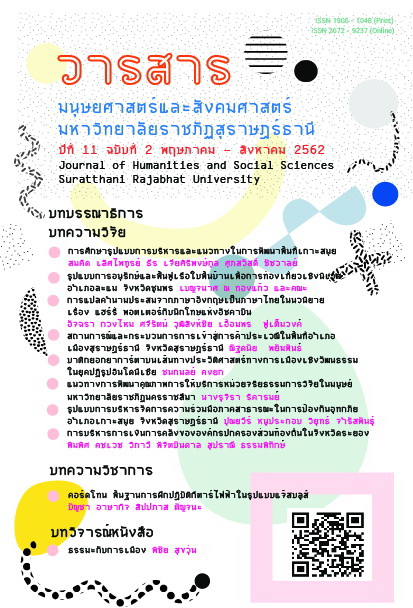Cross-Cultural Communication through the Translation of Compound Nouns from English to Thai in Harry Potter and the Prisoner of Azkaban
Main Article Content
Abstract
This study aimed at investigating translation strategies of compound nouns from English to Thai. The data were drawn from an English novel entitled “Harry Potter and the Prisoner of Azkaban”, written by J.K. Rowling, and the translated version by Waleeporn Wangsuekul. It was found that 1,540 English compound nouns occurred in the novel. Eight types of the target language were employed in translating the English compound nouns. Three types frequently used were: (1) noun phrases (47.01%), 2) compound nouns (37.66%), and (3) sentences (6.36%), respectively. Twenty translation strategies were used in translating the English compound nouns, three of which were used mostly were: (1) translation by building new compound words in the target language, using literally translation (20.58%), (2) translation by replacing compound nouns with phrases or sentences of culture in the target language (18.05%), and (3) translation by substituting familiar words in the target language (13.38%), respectively.
Article Details

This work is licensed under a Creative Commons Attribution-NonCommercial-NoDerivatives 4.0 International License.
All published manuscripts have been verified by peer-peer professors in the fields of humanities and social sciences. Reprinting of the article must be authorized by the editorial staff.
References
Achara Thappang. (2013). The Communication of Compound Nouns through the Translation of English to Thai. Master’s Thesis,
Phitsanulok: Naresuan University. (In Thai)
Amara Prasithrathsint. (2004). The Revolution of Word Borrowing and Terminology in Thai Society. Journal of Arts, 33(1), 207-209. (In Thai)
Anong Iangubol. (1984). An Analytical Study of Compound Words in Thai. Journal of Thai Language and Literature, 1(2), 56-62. (In Thai)
Baker, M. (1992). In Other Words: A Coursebook on Translation. London and New York: Routledge.
Barnwell, K. (1980). Introduction to Semantics and Translation. England: Summer Institute of Linguistics.
Beekman, J. & Callow, J. (1974). Translating the Word of God. Michigan: Zondervan.
Benjama Boonterm. (2008). A Study of Interjection Translation in Harry Potter and the Order of the Phoenix and Harry Potter and the
Half-Blood Prince. Master’s Thesis, Nakhonpathom: Mahidol University. (In Thai)
Chaluai Boonprasert. (2010). Introduction to Linguistics (4thed.). Bangkok: Dhonburi Rajabhat University. (In Thai)
Downing, P. (1977). On the Creation and Use of English NominalCompounds. Language, 53(4), 810-842.
Levi, J.N. (1978). The Syntax and Semantics of Complex Nominals. New York: Academic Press.
Rowling, J.K. (1999). Harry Potter and the Prisoner of Azkaban. United States: Scholastic.
Rowling, J.K. (2007). Harry Potter and the Prisoner of Azkaban. Translated by Waleeporn Wangsuekul. Bangkok: Nanmee books Publications. (InThai)
Sanchawi Saibua. (2007). Principles of Translation (8th ed.). Bangkok: Thammasat University Press. (In Thai)
Supannee Pinmanee. (2006). Advanced Translation (3rd ed.). Bangkok: Chulalongkorn University Press. (In Thai)
The Royal Institute of Thailand. (2003). Thai Dictionary by the Royal Institute 2003. Bangkok: Nanmee books Publications. (In Thai)
Unchalee Singnoi. (2005). Compound Nouns: Science and Art for Thai Word formation. Bangkok: Chulalongkorn University Press. (In Thai)
Unchalee Singnoi. (2006). Eating Terms: What the Category Reveals about the Thai Mind. MANUSYA: Journal of Humanities, 9(1), 82-109.
Upakit-Silapasan, Phraya (Nim Kanchanachiwa). (1996). Lak phasa Thai (Principles of the Thai Language). Bangkok: Thai Wattana Panich Press. (In Thai)
Wilaiwan Khanittanan. (1987). Compound Words: Meanings. Journal of Language and Linguistics, 5(2), 91-100. (In Thai)


